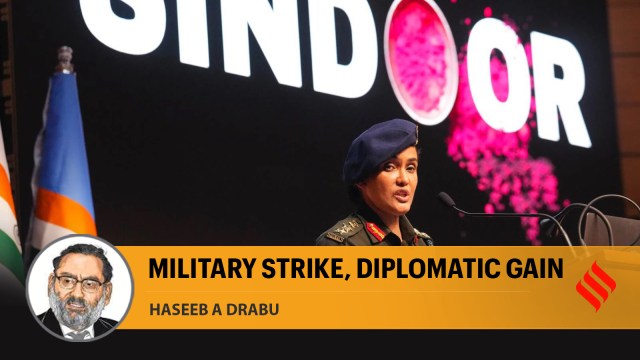
The tribal militias and irregular Pakistani forces that invaded Jammu and Kashmir in October 1947 have been known to generations of Kashmiris as “Kabalis”, mercenary raiders. Less than two decades later, in August 1965, Pakistan carried out large-scale infiltration into the Valley to precipitate insurgency in the state under Operation Gibraltar — local Kashmiris referred to them as “Mujahids” or militant missionaries. Post the Pahalgam carnage and Operation Sindoor, they shall be referred to, and remembered as, terrorists.
This is going to be the most transformative and enduring gain from the attack that was launched by the Indian armed forces on May 7 — a series of precision missile strikes targeting nine terrorist camps in Pakistan and Pakistan-occupied Jammu and Kashmir in response to the April 22 Pahalgam terror attack that killed 26 civilians. Beyond the evocative symbolism of the name, emphasising the personal loss of newlyweds in Pahalgam, there is a larger message that underlies the operation: It is not about Kashmir, its politics and political status anymore — it is about terrorism. For the first time, a clear distinction is being made between the Kashmir issue and terrorism. This will have far-reaching implications.
There is no denying the fact that a military move, like the one carried out, could have had substantial implications for the Kashmir issue, both regionally and internationally. For, the Kashmir conflict has long been an international concern, with numerous United Nations resolutions and attempts at third-party mediation since Partition. However, while the missile attack has amplified its global visibility, it stops short of taking it back to the international arena.
The real and larger success of the operation lies in it being an act of deterrence against terrorism that carefully avoided internationalising the Kashmir issue. This larger message was conveyed by focusing on terrorist infrastructure, such as the Jaish-e-Mohammed headquarters in Bahawalpur, Lashkar-e-Taiba camps in Muridke, and Hizbul Mujahideen facilities near Sialkot. As has been emphasised by the Defence Ministry, no Pakistani military or civilian targets were hit, ensuring the operation was confined to, and seen as, being anti-terrorist rather than a conflict with Pakistan with respect to the status of Kashmir.
To the extent that it is indeed so, Operation Sindoor builds on and carries forward the political position underlying the abrogation of the special constitutional position of J&K in August 2019, which made Jammu and Kashmir an internal matter of India, having only Pakistan-Occupied Kashmir as a bilateral dimension. As such, the strikes against Pakistan with missiles is not just a bold decision, but a carefully curated one that stops short of making it a war over Kashmir. Of course, in the process of the direct military strike deep into Pakistani territory, India was asserting its sovereignty and exercising its right to self-defence against cross-border terrorism.
If anything, the military action reflects a doctrinal shift on counter-terrorism by India, treating major terrorist attacks as triggers for conventional retaliation without needing to prove Pakistan’s state complicity. This approach bypasses the Kashmir issue’s complexities, focusing instead on dismantling terror networks.
The involvement of two nuclear powers, with a track record of extreme hostility and a history of fighting four wars, raises the stakes, prompting immediate reactions from major players like the United States, China, and Russia. All have, expectedly, urged restraint and de-escalation to prevent a broader conflict. The UN Secretary-General, for whatever it is worth, has called for maximum military restraint .But the context, nature, type and scale of the attack have been so curated and calibrated that there is hardly any risk of international bodies, such as the UN, and influential countries intervening more actively. Diplomatic efforts to mediate or stabilise the region could intensify, especially if the situation deteriorates with retaliatory actions.
That the Indian armed forces fired with stand-off weapons without crossing the LoC, thereby respecting the status quo, meant that the operation was carefully framed as a targeted strike on “terrorist infrastructure” and not as an attack on the sovereignty of Pakistan. By keeping the focus on terrorist infrastructure, India deflected Pakistan’s efforts to rally international support for Kashmir as a disputed territory. This has resonated with nations that have faced similar threats, and has the potential of earning India some international support and sympathy.
As such, while the attack brings Kashmir into the global news spotlight, it has not so far led to any internationalisation of the “Kashmir issue” beyond its existing status. This is a transformative shift. Of course, much will depend on the aftermath — not just on the possible broader military confrontation but also on how the domestic responses are managed. For now, India’s missile response underscores its determination to counter terrorism decisively.
More than the unilateral response to a terrorist attack, its framing as a matter of national security rather than a Kashmir-specific conflict is what is important. By targeting terror camps and avoiding Pakistani military assets, India kept the operation focused on counterterrorism, sidestepping the broader geopolitical dimensions of the Kashmir dispute.
The Indian leadership – political, security and diplomatic – has been in conversation with global players and partners like the US, UK, Russia, UAE, and Saudi Arabia after the strikes without seeking international involvement or mediation. By doing so, the operation, and more importantly, India’s larger narrative that it is a bilateral matter between India and Pakistan, is avoiding forums like the United Nations, where Kashmir has been internationalised. This global response indicates that Operation Sindoor was perceived as a counterterrorism measure rather than a move to alter Kashmir’s current status.
The writer is former finance minister of Jammu & Kashmir